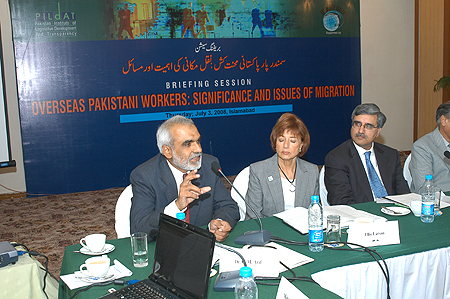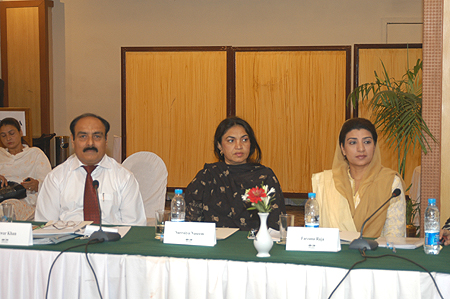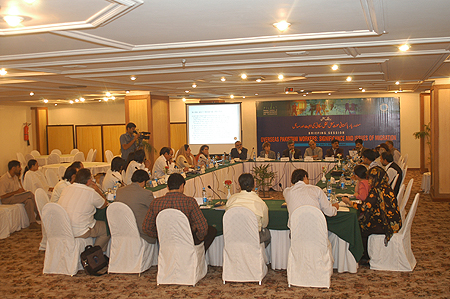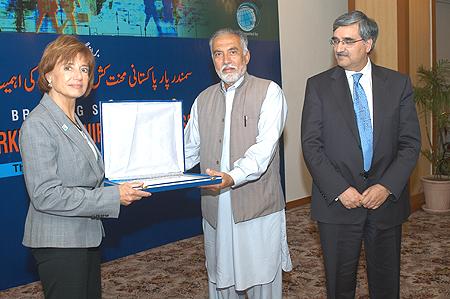|
|
| |
| EVENTS |
|
|
> Parliamentarians call for Developing and Implementing Effective Policies for Promotion and Protection of Overseas Pakistani Workers
PILDAT holds Briefing Session on Overseas Pakistani Workers: Significance and Issues of Migration |
| |
|
Briefing Session
July 03, 2008
Islamabad
|
|
| |
Islamabad July 03: In a PILDAT organiszed briefing session for Members of Parliament and key stakeholders on �Overseas Pakistani Workers: Significance and Issues of Migration� participating legislators from all major political parties vociferously stressed the need for developing effective policies and their effective implementation for the promotion and protection of Overseas Pakistani Workers. |
|
| |
Introducing the topic of the Briefing Mr. Ahmed Bilal Mehboob, Executive Director of PILDAT said international migration is one of the defining issues of the 21st century as more people are on the move today than at any other point in human history. He said that although issues related to Overseas Pakistani Workers and migration are not generally seen to be glamourous yet it is very important for policy makers and practitioners to develop a comprehensive understanding of the significance of these issues. He said that this briefing aimed to broaden the understanding of legislators and others who matter in decision � making and to make suggestions on what can be done to pursue more effective policies and practices for protection of migrant workers.
|
|
| |
International and national experts on migration including Ms. Ellie Larson, Executive Director American Center for International Labor Solidarity, Washington D.C. ; Dr. Sabur Ghayur, Chairman Policy Planning Cell, Ministry of Labour, Manpower and Overseas Pakistanis; Dr. G. M. Arif, Dean Faculty of Development Studies, PIDE; Mr. Zia Awan, President, Lawyers for Human Rights and Legal Aid; and Mr. Zaigham Khan, Development Consultant addressed the parliamentarians, civil society representatives, international organizations and media present at the briefing. The speakers highlighted the key issues related to migration & migrants; magnitude and trends of migration from Pakistan to other countries; problems faced by migrants and international experience of migration. |
|
| |
Initiating the briefing Dr. Sabur Ghayur drew attention to why Pakistan needs to promote migration, the existing institutional and legal frameworks in the country and the policy initiatives underway for promoting migration. He said that promoting migration was important as it addressed employment and poverty issues, tackles development resource constraints, and contributes to human capital formation as well as to brain gain. He noted that the key areas to focus on for promoting migration included an aggressive marketing strategy in destination countries through signing of MOUs/road shows etc; efficiency in visa processing; rationalizing and strengthening Overseas Employment Promoters; collecting related data; foreign language and other trainings; developing migration information systems and feminization of migration. He said that there was a need to focus on returning migrants and their reintegration. He said that Pakistan could enhance its share in global markets by producing sufficiently trained workers, carrying out effective monitoring of overseas markets, developing cooperative mechanisms and managing reverse flow of migrants. He also said that a National Migration Policy is currently in process under the Ministry of Labor, Manpower & Overseas Employment and will be released to the public for consultation in the near future. |
|
| |
Speaking on the trends and magnitude of migration Dr. G. M. Arif said that the basic trend followed by Pakistanis has been towards Middle East and the people migrating are mostly concentrated in 20 districts of Pakistan. He highlighted that there was a need to focus on improving the skill level of Pakistani migrant workers so that they may be able to better compete with migrants from other countries like India, Bangladesh, Philippines and China. He underscored the need to diversify the flow of migrants from the existing three destinations of Middle East, North America and Europe to countries in the Far East. He also suggested that the forthcoming census could be helpful to collect information about overseas migration. |
|
| |
Mr. Zia Awan said that Pakistan was not yet a signatory to the International Convention on Protection of Migrant Workers and it was imperative for Pakistan to become a signatory in order to protect the rights of migrant workers He said that legislators can support legislation and policies for sending trained professionals as labour attaches to Pakistan Embassies with working hours to suit the overseas Pakistani workers; reducing cost of visa processing; collecting data on outgoing and incoming migrants; inclusion of Ministry of Health in the protection especially due to the increasing risks of AIDS/HIV related to migrant workers; and develop a regional framework such as the SAARC countries outlining minimum standards for migrant workers. |
|
| |
Mr. Zaigham Khan highlighting the nexus between migration and human trafficking and explained the economic, social and political factors involved in migration. He explained that about 3.5 - 4 million people each year move illegally internationally. |
|
| |
Ms. Ellie Larson talking in the context of international experience of migration noted that even in the United States issues related to migrant workers have not been addressed satisfactorily and it remains a contentious issue. She said that the Governments have the responsibility to develop certain frameworks to protect the right of employers and the workers focusing not only laws but implementation as well as benefits for workers can only be achieved through this. She highlighted that the media has a very important role to play in disseminating information and highlighting the issues among the public and concerned policy makers. |
|
| |
Taking part in the in the discussion Senator Tariq Azeem, a former Federal Minister of State for Overseas Pakistanis said that Pakistan was the 4th largest migrant exporting country in the world and as such was a very important player in the context of international migration. He said that Pakistan needed to develop a tri-dimensional policy for workers moving to the Middle East, North America and Europe as each region had different characteristics.
Immigration experts and parliamentarians during the discussion voiced the need for migrant workers to have the right to form trade unions in the destination countries so as to press for their demands and ensure their protection as well as to bring down the migration related costs. At the conclusion of the session Mr. Pervaiz Khan, MNA presented a memento to Ms. Ellie Larson on behalf of PILDAT.
Participating parliamentarians included Senator Tariq Azeem, PML; Senator Dr. Kausar Firdaus, MMA; Ms. Farzana Raja, MNA ,PPP; Ms. Tahira Aurengzeb, MNA, PML-N; Ms. Nuzhat Amir, MNA, PML-N; Mr. Pervaiz Khan, MNA, ANP; Mr. Ejaz Virk, MNA-PML-N; and Sayed Haider Ali Shah, MNA, ANP. |
|
| |
|
|
| |

|
|
| |
|
|
| |

|
|
| |
|
|
| |

|
|
| |
|
|
| |

|
|
| |
|
|
| |

|
|
|
|
|
|
|
|
|